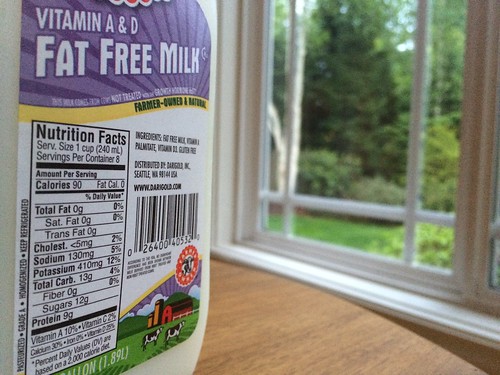Our middle schooler came home from school yesterday and noticed for the first time that our family drinks whole milk, not the skim milk that her teacher had just recommended as the “healthier choice.” Delighted to have learned something at school that could immediately benefit the family, she suggested we switch. Uh, not so fast.
Turns out there is no evidence that skim or low-fat milk is better for you than whole milk. In fact, a large five-year study of 12,000 middle schoolers found that kids who drink skim milk actually gain weight. A later study among two year olds found the same thing. So did another one, conducted on 10,000 kids published last year.
The American Academy of Pediatrics specifically recommends low-fat milk for all kids over 2. So does the official Kids Eat Right web site of the Academy of Nutrition and Dietetics. None of the web sites gives sources for their recommendations, but I assume they are simply following the decades of research that pretty conclusively shows a link between high cholesterol and heart disease. Whole milk has more fat, which means more cholesterol, which means more heart disease. Right?
Well, that sounds good in theory, but it appears to be based on research into a key component of milk (the fat), not milk itself. The best of science knows so little about how food reacts in the presence of other foods; it's not surprising that large studies often appear to disprove the received wisdom about something that seemed sound in theory. It could be that fat, by itself, causes high cholesterol and heart disease, but that fat consumed as part of a dairy product is good. In fact, I think that’s likely.
My opinion is converging on something that I first saw articulated by Michael Pollan (“eat food” — i.e. things your grandmother would recognize) and of course by many others in the natural food as well as ancestral health movements. Get as close to nature as you can. When food is processed, it changes; whether that’s good or bad — well, it depends. After all, heating something (aka “cooking”) is just a form of processing food. Salt is a type of rock, a mineral that you wouldn’t normally just go eat; but it can be a perfectly safe and healthy food additive. It depends. Still, when in doubt it pays to go back to basics. You step away from tradition at your peril. Thousands of years of dairy tradition — especially it’s associated with your genetic heritage — are not something to lightly deny.
Bleeding out a natural component of cow’s milk (the fat) is a recent addition to the set of food choices we can make. Do you really know what you’re doing when you deprive your body of something that nature intended?
